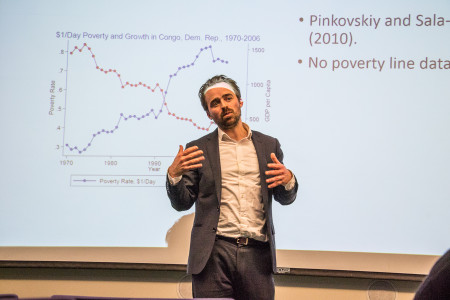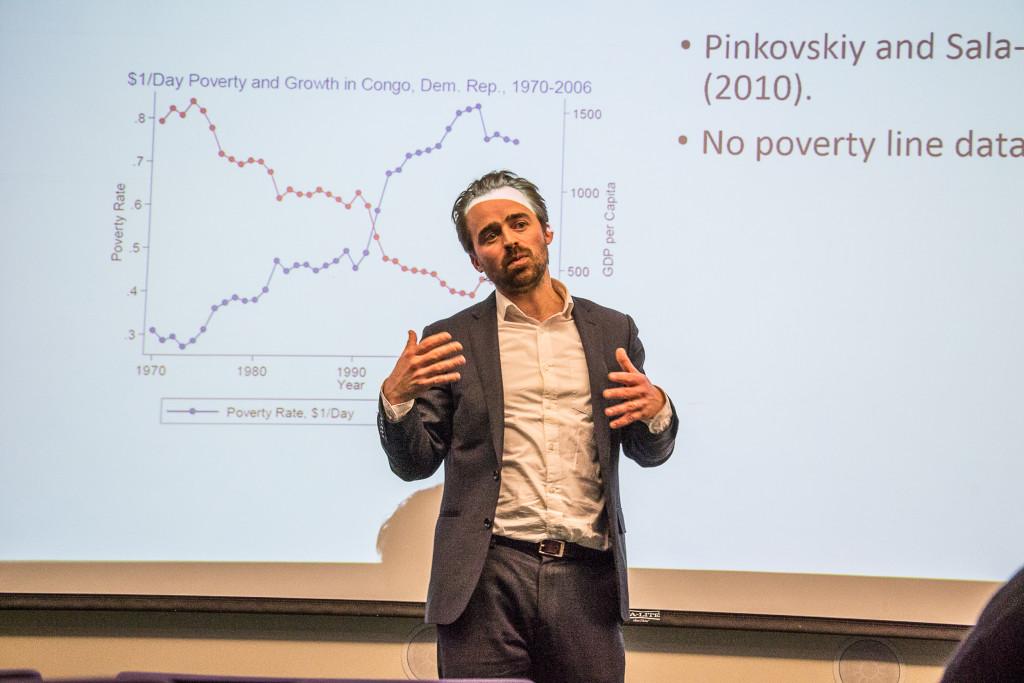
Lily Bohlke, Copy Editor
bohlkeli@grinnell.edu
Touching on many things from penguins to Africa, Global Change and International Relations Professor Morten Jerven spoke about the African economy on Wednesday, March 2. Jerven is an economic historian with a PhD from the London School of Economics and has published two books on economic development in Africa.
Jerven opened the talk by showing two covers of “The Economist.” One was from 2000 with a headline referring to Africa as “The Hopeless Continent,” while the other, from 2011, reads “Africa Rising: The Hopeful Continent.” This juxtaposition reveals the confusion about Africa’s economic state that Jerven went on to explain to the audience.
“How could economists miss decades of growth?” Jerven asked.
In his book and during his talk on Wednesday, Jerven claimed that economists have misunderstood economic growth in Africa for decades. After comparing the world’s average per capita GDP to Africa’s average per capita GDP, economists have accepted that Africa’s economic growth had chronically failed as a stylized fact, meaning economists have accepted this as truth.
Some common explanations by economists for the failure include lack of social capital, lack of openness to trade and deficient public services. Focusing on the lack of openness, aid organizations such as the International Monetary Fund (IMF) and the World Bank have implemented many Structural Adjustment Plans (SAPs), encouraging privatization and liberalization.
However, Jerven argued these SAPs led to a couple of “lost decades” of economic growth. High aid dependence, fostered by organizations like the IMF and the World Bank, correlate with slow economic growth. Economists have historically recognized this causation, but the current economic disparities are more complicated and potentially out of their hands.
“History became very good for economists, not because they are good historians, but because it is an admirable way of avoiding reverse causality,” Jerven said. “Historical variables are in the past. The economic effect today does not affect borders yesterday. It must go the other way around, but it’s not the same thing with the budget deficit.”
Jerven also discussed the ways Africa has failed, debating whether or not Africa is “trapped in history.”
However, Jerven argued that “it’s a paradox to be told that ‘history and institutions matter’ and then subsequently to be presented with what one commentator called ‘Wikipedia with regressions.’”
Next, Jerven talked about Africa’s statistical tragedy, encouraging a move from economists’ focus on the lack of growth to growth itself. There are huge data gaps for many African economies, and yet many economists present arguments as though those data points exist.
“For half of the countries, [economists] are just guessing,” he said. “It’s a case of the PR department being many steps ahead of the knowledge department.”
Jerven closed his presentation arguing in favor of considering what sector of global society decides what constitutes economic norms. Vastly different settings have vastly different perspectives.
“Anthony Hopkins puts this well when he says that a lot of these comparisons are like trying to decide whether life is more difficult for camels or penguins,” Jerven said. “There are of course adaptations for both of them, and you wouldn’t dream of ranking them. If you did so, you would be very careful about letting the penguins doing the ranking.”































































